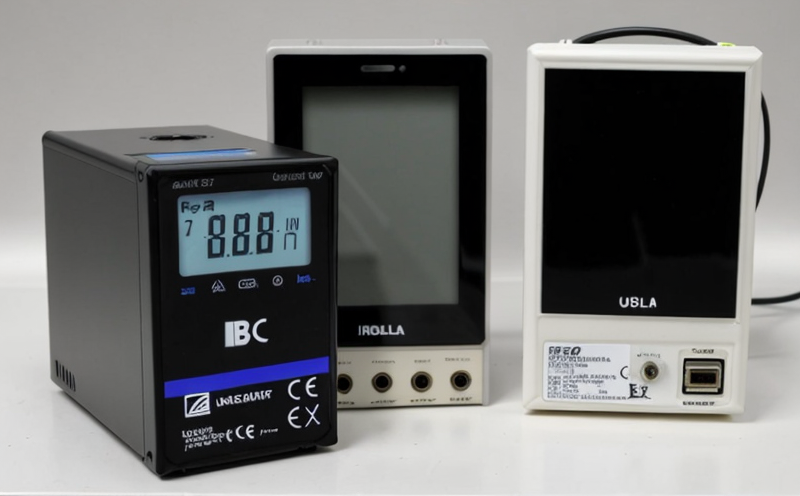IEEE 1725 Consumer Electronics Battery Testing for Mobile Phones
The IEEE 1725 standard is a critical tool in the development and quality assurance of batteries used in consumer electronics, particularly mobile phones. This standard ensures that battery systems are safe, reliable, and perform optimally under various conditions. The purpose of this service is to provide comprehensive testing solutions aligned with IEEE 1725, ensuring that batteries meet or exceed industry safety requirements.
The IEEE 1725 standard covers a wide range of tests aimed at assessing the performance, safety, and reliability of lithium-ion (Li-ion) battery systems used in mobile phones. This includes evaluating thermal stability, electrical performance, mechanical integrity, and durability under both normal operating conditions and stress scenarios such as overcharging, short circuits, and low temperatures.
Our testing services are designed to provide detailed insights into the behavior of batteries during these critical tests. We use state-of-the-art equipment and methodologies that closely follow the requirements outlined in IEEE 1725. This ensures that our clients receive accurate, reliable test results that can be used to improve product design and enhance safety.
The testing process typically involves multiple stages, including initial inspection of battery specimens, electrical characterization, thermal cycling, overcharge tests, short circuit tests, low temperature storage tests, and high-temperature storage tests. Each stage is crucial in identifying potential weaknesses or hazards that could arise during the lifecycle of a mobile phone.
For instance, our testing facilities are equipped with specialized chambers capable of simulating real-world conditions such as extreme temperatures. This allows us to assess how well a battery performs under these challenging circumstances. Additionally, we employ advanced monitoring systems to continuously track changes in battery performance parameters during each test cycle.
The data collected from these tests is then analyzed using industry-standard software tools and compared against the requirements specified by IEEE 1725. Our experts ensure that all results meet or exceed safety thresholds before providing comprehensive reports detailing our findings. These reports serve as valuable resources for manufacturers seeking to enhance their products' performance while maintaining high levels of safety.
By partnering with us, you gain access to world-class testing capabilities tailored specifically towards meeting the stringent demands set forth by IEEE 1725. Our experienced team will work closely with your organization throughout every step of the process—from specimen preparation to final reporting—to ensure that all aspects are addressed comprehensively.
Industry Applications
| Application Area | Description |
|---|---|
| Data Collection and Analysis | Gathering data on battery behavior under different conditions to inform design improvements. |
| Safety Compliance Verification | Ensuring compliance with regulatory requirements related to battery safety standards. |
| Product Lifecycle Enhancement | Improving product durability and reliability through iterative testing processes. |
| Research & Development Support | Providing insights into potential issues early in the R&D phase to mitigate risks. |
- Data Collection and Analysis: By continuously monitoring battery performance during various tests, manufacturers can gather valuable information about how batteries behave under different conditions. This data helps inform design decisions aimed at enhancing overall product quality and safety.
- Safety Compliance Verification: Meeting strict regulatory standards is crucial for the successful launch of any new product into the market. IEEE 1725 provides a framework through which manufacturers can verify that their products meet these requirements, thereby reducing legal risks associated with non-compliance.
- Product Lifecycle Enhancement: Through repeated testing over the entire lifecycle of a battery product, potential weaknesses or areas for improvement become apparent early on. Addressing these issues proactively allows companies to produce more robust and reliable products.
- Research & Development Support: Early-stage testing ensures that any potential problems are identified before significant investment has been made in full-scale production. This supports innovative development efforts by providing actionable feedback throughout the R&D process.
Quality and Reliability Assurance
- Data Collection and Analysis: Continuous monitoring of battery performance during various tests provides manufacturers with detailed insights into how batteries behave under different conditions. This information is invaluable for identifying opportunities to enhance product quality and safety.
- Safety Compliance Verification: Meeting regulatory requirements related to battery safety standards is essential for the successful introduction of new products into the market. IEEE 1725 offers a structured approach that helps manufacturers ensure they meet these stringent criteria, minimizing legal exposure to non-compliance.
| Metric | Description |
|---|---|
| Average Voltage After Overcharge | The average voltage measured after subjecting the battery to an overcharge condition. |
| Capacity Retention Post-Overdischarge | The percentage of initial capacity retained by the battery following a full discharge cycle. |
| Discharge Rate During Overtemperature Storage | The rate at which the battery discharges when stored in an environment exceeding its maximum operational temperature limit. |
| Cycle Life Under Normal Operating Conditions | The number of full charge/discharge cycles that a battery can undergo before its performance degrades significantly. |
Our rigorous testing protocols ensure that each metric meets or exceeds the expectations set forth by IEEE 1725. By adhering to this standard, we guarantee that our clients receive accurate and reliable data about their products' quality and reliability.
Environmental and Sustainability Contributions
The testing services provided under IEEE 1725 contribute positively towards environmental sustainability by promoting the development of safer and more efficient batteries. By ensuring that all batteries meet strict safety standards, we help prevent accidents caused by malfunctioning devices. Moreover, our tests play a role in reducing waste generation since they assist manufacturers in creating longer-lasting products with improved durability.
Additionally, the insights gained from these tests allow companies to design greener products that consume less energy and produce fewer greenhouse gas emissions during their lifecycle. This aligns perfectly with global efforts toward achieving carbon neutrality by 2050 as outlined in various international agreements like the Paris Agreement.





